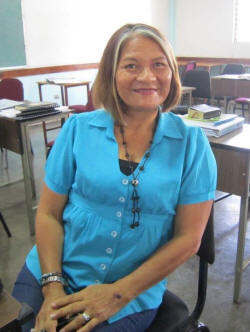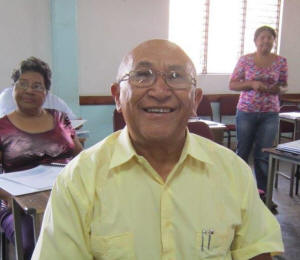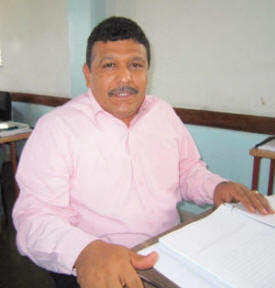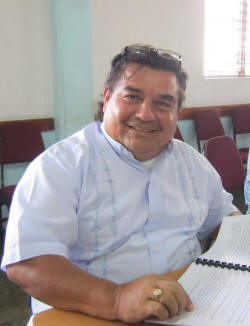|
Five Lessons I Learned
Teaching ISUM
By Rod Boyd
I just finished teaching the two-week
ISUM intensive course on Principles of Administration
to a group of 28 pastors and ministry leaders in
Barquisimeto, Venezuela. Most of the students were from
Venezuela; four were from other countries. There was such a
diverse mixture of both education and ministry… a Colombian
missionary pastoring in the jungle, the national secretary
for the A/G of Venezuela, a youth pastor from a large
church, a Brazilian missionary and pastor.

ISUM—Instituto de Superación Ministerial, or
Latin America Advanced School of Theology in English—is the Assemblies of
God international school for Spanish-speaking countries that allows students
to complete their Bible school bachelor of arts degree. There are twenty
courses offered in four intensive seminars, each lasting four weeks. Many
countries require at least some ISUM training for their license or
ordination credential. A combination of national and missionary educators
teach courses that are both academic and practical.
ISUM’s slogan is Conocimiento y Fervor
(Knowledge and Zeal). Seminars are held in a Bible School or camp where
there are dorms to facilitate a strong atmosphere of community. Prayer,
worship and the Word are always present, inside and outside of the
classroom. Students and teachers live together, eat together, pray together
and study together.
This latest ISUM experience reminded me of why I teach.
Following are five lessons that I learned. Actually, these are five
refresher courses in things I already knew, but needed to be reminded about!
Teaching is a lot of work and
sacrifice. Even more if you happen to be directing the seminar!
Teaching requires discipline to research and prepare. Because of the intense
nature of the seminar (20 hours in two weeks), I had to prepare nearly
everything in advance… course plan, homework assignments, tests, content and
audiovisual presentation. Teaching ISUM also requires me to set aside two
weeks of my busy schedule, plus travel to the seminar site. In addition,
good teaching requires me to enter into relationship with my students, to
care about them and to cultivate the fruit of the Spirit in these
relationships. Because of all of the work, it would actually be a lot easier
to just skip teaching. Then why do I teach?
Teaching is an organic function
for the missionary. I have to teach! I can’t imagine a missionary not
involved in teaching, training or discipling people. All agree that one of
the four main missionary tasks is training. But that doesn’t mean that
missionaries involved in the other three—reaching (evangelism), (church)
planting and touching (compassion ministries)—don’t need to be teaching,
training and discipling others along the way. Teaching is at the core of the
2 Timothy 2:2 formula—passing along what we’ve learned to others who will in
turn pass it on. These days missionary budgets are harder to raise… and
harder to keep! I can make a passionate case for the biblical principle of
multiplying ministry. It is a great missions model!
Teaching helps me stay really
connected. I didn’t see another missionary or North American during
my time Barquisimeto. I think this “cultural isolation” really helped me
this time to connect with my students and the other teachers… even though at
times I felt a little like the gringo mascot!
I think the course that I taught helped me to connect. I
tried to help the students focus on their own leadership skills and
experience during the course. One of their tareas (assignments) was to write
a reflection paper on leadership and administration in their ministry—how
spiritual gifts functioned in their ministry, their leadership style, their
strengths and weaknesses, and the exercise of planning, organization,
direction and control (elements of the administrative process) in their
ministry. One of my students asked, “This is the first time I’ve ever
written so much about myself.” Another asked, “Profe (professor), why do you
want to know so much about me?” I was not prepared for their honest and
transparent assessments of their leadership. Not only did it help the
students understand themselves better, but I was touched by their stories of
service and sacrifice for the kingdom.
 This very personal knowledge combined with multiple
opportunities to fellowship over a meal or in passing, helped me connect
with them on a personal level. These are influential connections. Whether we
are teaching a Bible school class, ISUM or Facultad de Teología (master’s
level school), we are connecting with both present and future pastors and
national leaders. Teaching in these A/G institutions and schools also
connects us with the official training “pipeline” in our countries. When we
teach we connect both with the individual and with the organization. This very personal knowledge combined with multiple
opportunities to fellowship over a meal or in passing, helped me connect
with them on a personal level. These are influential connections. Whether we
are teaching a Bible school class, ISUM or Facultad de Teología (master’s
level school), we are connecting with both present and future pastors and
national leaders. Teaching in these A/G institutions and schools also
connects us with the official training “pipeline” in our countries. When we
teach we connect both with the individual and with the organization.
Teaching
is a privilege. I am privileged to be a missionary! Today’s Latin
America and Caribbean missionaries ride on the coattails of some pretty
dedicated and incredible pioneers. Our national brothers and sisters
remember well how these missionaries impacted their lives.
I was sitting with Carmen, one of my more senior
students, at lunch one day. I asked her about her name since her school
records show her name as Macaira. She glowed as she told me the story of how
many years ago a lady missionary who taught her in Bible School couldn’t
pronounce her name Macaira, so decided to call her by her middle name
Carmen. It stuck and today everyone calls her Carmen! That missionary lady
built much of the Bible school in Barquisimeto that has trained thousands
and that we were using for ISUM.
 Missionaries, even younger missionaries, continue to have
surprising influence that opens doors of significant opportunity. As we were
preparing for the mission field, it never entered my mind that I would be
teaching Bible school or ISUM. I didn’t think I qualified. As it turned out,
my accredited BA degree was more than most of the other teachers. But that’s
not why they asked me to teach. It was because I was a missionary. We are
privileged; and are privileged to teach. Missionaries, even younger missionaries, continue to have
surprising influence that opens doors of significant opportunity. As we were
preparing for the mission field, it never entered my mind that I would be
teaching Bible school or ISUM. I didn’t think I qualified. As it turned out,
my accredited BA degree was more than most of the other teachers. But that’s
not why they asked me to teach. It was because I was a missionary. We are
privileged; and are privileged to teach.
Teaching
inspires me to keep going. I am humbled to think about the honor I
had to teach these 28 students. Each has his or her story of spiritual
journey and ministry formation. Three of these impacted me.
Pastor Jose is a Brazilian missionary who works at church
planting. This elderly gentleman has planted multiple churches in three
countries. Angel, a pastor of one of those daughter churches is also
studying with him. Pastor Jose’s sweet, humble and positive presence
permeates the classroom. Yet, this man is a true apostle! Who am I to teach
him?

Pastor
Ohtiel is the General Secretary of the A/G in Venezuela. He pastors a church
of 2,000 in the state of Falcon. Under his leadership, his District planted
100 churches last year! He’ll probably be the next superintendent. Yet, he
humbled himself to continue his training and is studying with ISUM. And he
brought three of his pastors to join him! Why am I trying to teach him?
Pastor
Humberto serves along the Colombian/Venezuela border, pastoring a series of
churches and encouraging other pastors in that remote jungle area.
 He told
me story after story of how his life has been at risk from guerillas,
police, poisonous snakes and spiders. I felt like I was listening to the
Apostle Paul’s 2nd Corinthians chapter 11 list! What do I have to share with
this committed servant? He told
me story after story of how his life has been at risk from guerillas,
police, poisonous snakes and spiders. I felt like I was listening to the
Apostle Paul’s 2nd Corinthians chapter 11 list! What do I have to share with
this committed servant?
In fact, who am I to teach any of these? Their spirit,
their example and their ministry inspire me!
Even though teaching is hard work and may require some
sacrifice, this pales in comparison to the return on our investment—lives
and ministries forged for the Kingdom. As a missionary, I recognize how
important and how natural it is for me to teach. It keeps me connected to
the national church training structure, but more importantly to the lives of
individual students whose lives and ministries continue to amaze and inspire
me. I’m so privileged to be able to teach!
|